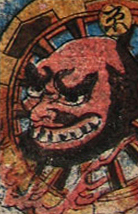Monster
Monster refers to a type of creature often found in mythology, folklore, and fiction. Typically depicted as physically or morally grotesque, monsters are usually antagonistic or fearsome entities that challenge heroes and threaten the normal order of society. The concept of monsters encompasses a wide range of beings, including mythical creatures, supernatural beings, and mutants. Monsters can serve various symbolic or narrative functions, often embodying human fears, societal taboos, or the unknown.
Etymology[edit | edit source]
The word "monster" derives from the Latin monstrum, meaning "omen" or "miracle". It originally referred to a creature that was considered a sign from the divine, often interpreted as a warning or a message from the gods. Over time, the term evolved to describe beings that are physically or morally outside the norms of society, including both mythical creatures and real anomalies.
Characteristics[edit | edit source]
Monsters are characterized by their deviation from the natural order. This can manifest physically through unusual size, shape, or abilities, or morally through malevolent intentions towards humans. They often inhabit the fringes of the known world, such as deep forests, remote islands, or other dimensions, reinforcing their association with the unknown and the uncanny.
Types of Monsters[edit | edit source]
Monsters can be broadly categorized into several types, including:
- Mythical Creatures: Beings from mythology and folklore, such as dragons, giants, and chimeras.
- Supernatural Beings: Entities with magical or supernatural powers, including ghosts, demons, and vampires.
- Mutants: Creatures altered by external factors, such as radiation or genetic manipulation, often found in science fiction.
- Cryptids: Animals or beings whose existence is suggested but not scientifically proven, like Bigfoot or the Loch Ness Monster.
Cultural Significance[edit | edit source]
Monsters play a significant role in various cultures, serving as cautionary tales, moral lessons, or representations of societal fears. They can symbolize the unknown, the forbidden, or the repressed aspects of human nature. In modern times, monsters continue to be a popular subject in literature, film, and video games, reflecting contemporary issues and fears.
In Literature and Media[edit | edit source]
Monsters have been a staple of literature and media for centuries, from the ancient epics like Beowulf and The Odyssey to modern horror and science fiction genres. They serve as obstacles for heroes, catalysts for stories, or symbols of internal or external conflicts. The portrayal of monsters can range from purely evil beings to misunderstood creatures that challenge our perceptions of monstrosity and humanity.
See Also[edit | edit source]
- Need help finding a doctor or specialist anywhere in the world? WikiMD's DocFinder can help with millions of doctors!
| This article is a stub. Help WikiMD grow by registering to expand it. |
Navigation: Wellness - Encyclopedia - Health topics - Disease Index - Drugs - World Directory - Gray's Anatomy - Keto diet - Recipes
Search WikiMD
Ad.Tired of being Overweight? Try W8MD's physician weight loss program.
Semaglutide (Ozempic / Wegovy and Tirzepatide (Mounjaro) available.
Advertise on WikiMD
WikiMD is not a substitute for professional medical advice. See full disclaimer.
Credits:Most images are courtesy of Wikimedia commons, and templates Wikipedia, licensed under CC BY SA or similar.
Contributors: Prab R. Tumpati, MD





